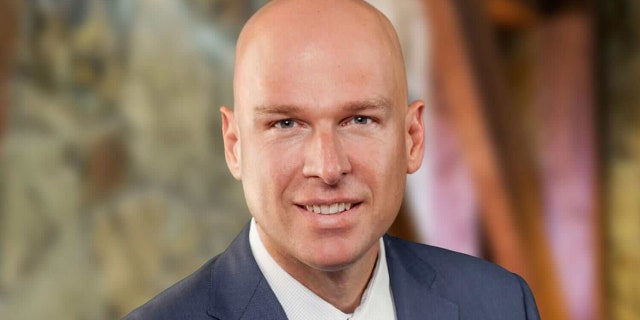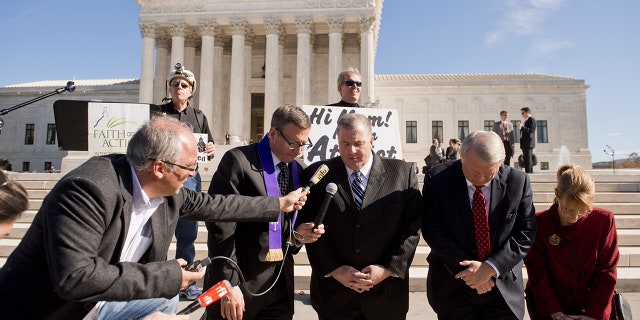NEWYou can now listen to Fox News articles!
A Michigan county board stopped holding prayers before legislative meetings last month, and a Christian conservative legal organization argued that the board caved under incomplete information from a secularist nonprofit, despite the Supreme Court‘s repeated approvals of the longstanding practice.
The Leelanau County Board of Commissioners voted 5-2 in January to remove the prayer portion of their meeting after the Freedom From Religion Foundation (FFRF), which advocates for atheists, agnostics, and promotes the separation of church and state, sent them a letter in September urging them to end the practice.
“And can I say ‘Amen’ to that?” FFRF Co-President Annie Laurie Gaylor said in a news release after the decision. “We commend the hard work of our local activists who fought for inclusivity and the wisdom of the Leelanau County Board for listening.”
FORMER WHITE HOUSE INTERN OPENS AUTISM MUSEUM IN MICHIGAN
In the letter, FFRF wrote that some residents were concerned and had reported that the board recently started opening its meetings with Christian prayer. About 30% of Leelanau County residents identify as religiously unaffiliated, according to FFRF.
The letter stated that the board’s policy limited those who could deliver an invocation to those who represent an organization with an established presence in the county. FFRF argued that those limits ensured the prayers would be Christian, instead of other religious or nonreligious beliefs of those in Leelanau County.
“We write to the request [sic] that the Board end its prayer practice, either by replacing it with a moment of silence, or by removing it completely, in order to respect the views of all Leelanau County residents,” the letter added.
In response, the First Liberty Institute, a law firm dedicated to defending and restoring religious liberty, wrote its own letter to the board dated Tuesday, over concerns that they ended the practice based on an “inexcusably incomplete information and legal analysis,” from FFRF.
This Nov. 5, 2020, file photo, shows the Supreme Court in Washington.
(AP Photo/J. Scott Applewhite)
While both letters cited the 2014 Supreme Court case Town of Greece v. Galloway – in which the Court ruled that legislative bodies, like city councils, could begin meetings with prayer even if it favors a specific religion – the FFRF letter failed to disclose that the U.S. Court of Appeals for the Sixth Circuit – in which Leelanau County sits – concluded that legislative invocations are permitted under the U.S. Constitution, whether led by chaplains, local volunteers, or elected officials.
Jeremy Dys, special counsel for litigation and communications at First Liberty, was blunt when writing about the omission from FFRF.

Jeremy Dys<strong>, </strong>Special Counsel for Litigation and Communications at the First Liberty Institute, wrote a letter dated Tuesday to the Leelanau County Board of Commissioners following their decision
(Jeremy Dys, First Liberty Institute)
“This is controlling precedent for Leelanau County. Thus, it is inexplicable and outrageous that any attorney purporting to analyze the law on this topic would intentionally omit or accidentally ignore reference to County of Jackson,” Dys wrote in the letter, referring to Bormuth v. County of Jackson (2017).
“It’s like leaving out in a recipe for sweet tea, it’s like leaving out that you’re supposed to put sugar in it,” Dys told Fox News via phone. “It’s that atrocious.”
MICHIGAN GOP FIRES BACK AS DEM WHITMER BLASTS ‘FREEDOM CONVOY’
FFRF did not immediately respond to a request for comment from Fox News.
In the case of Town of Greece v. Galloway, the Court decided that the town of Greece, New York, may permit volunteer chaplains to open each legislative session with a prayer. The court ruled, 5-4, that prayers before the meeting did not violate the constitution prohibition against government establishment of religion.

Religious activists pray following oral arguments in the case of Town of Greece v. Galloway dealing with prayer in government, outside the Supreme Court in Washington, DC, on November 6, 2013. (SAUL LOEB/AFP via Getty Images)
In its letter, FFRF argued that a critical factor in the Court’s decision in finding the practice in Galloway did not violate the Constitution was because Greece “represented that it would welcome a prayer by any minister or layman who wished to give one.”
“The Supreme Court’s decision would have been different had the town used the prayer opportunity to discriminate against minority religions,” FFRF argued.
Dys said the Sixth Circuit decision gave the approval to have elected officials themselves lead such prayers.
The Supreme Court also upheld legislative prayer in a case out of Nebraska nearly forty years ago.
In that case, Marsh v. Chambers (1983), the Court noted that the “opening of sessions of legislative and other deliberative public bodies with prayer is deeply embedded in the history and tradition of this country,” and “has coexisted with the principles of disestablishment and religious freedom” since our founding.
Marsh specifically dealt with the practice of the Nebraska legislature to pay a chaplain to deliver legislative invocations ahead of its unicameral meetings. By approving the practice in the case, the Court approved that legislative bodies like the board can employ a chaplain who would, among other things, open public meetings with prayer.
The Sixth Circuit reviewed the decisions of Marsh and Greece.
CLICK HERE TO GET THE FOX NEWS APP
“We are unaware of the motivations giving rise to your decision,” Dys added in the letter to the board. “However, if the Commission based its decision solely upon the letter sent by FFRF, it did so based upon woefully incomplete information. In light of the information articulated herein, that decision should be reconsidered.”
Leelanau County is located on the northwest Lower Peninsula of Michigan.